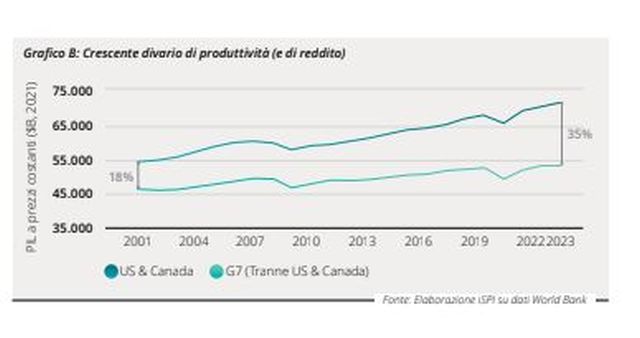ROME (ITALPRESS) – While global output has increased, the G7 economies have nevertheless grown more slowly than their G20 counterparts, with a widening productivity gap between North American countries and other G7 members: from 18 percent in 2001 to 35 percent in 2023 (+17 percent). This is a factor that could weaken the ability of the G7 to support the least developed countries, particularly those in Africa, which are struggling with high public debt and on which 17% of government revenues are dedicated to servicing foreign debt, to the detriment of investment in productive sectors and public services with inevitable negative impacts on economic growth.These are some of the key findings contained in the B7 Flash, the in-depth study by Confindustria and Deloitte prepared on the occasion of the “G7 – Industry Stakeholders Conference: Leaving no one behind: Industry for Development,” organized on the sidelines of the G7 Ministerial on Development scheduled to be held in Pescara, Italy, Oct. 22-24. “In an uncertain and rapidly changing global landscape, G7 countries have a key role in promoting effective policies for sustainable development and international cooperation. G7 countries are not advancing at the speed they should to achieve the 2030 Agenda, showing uneven progress in achieving the SDGs with impacts even beyond their borders,” says Barbara Cimmino, vice president for Export and Investment Attraction at Confindustria. “Making trade and investment engines of sustainable Sdgs-oriented growth in the least developed countries, particularly in Africa, is a collective imperative: as UNDP reports, less than 6 percent of the 32 measurable targets – out of a total of 169 – are on track to be achieved by 2030 in Africa. Of the remainder, 21 have yet to be achieved and negative trends need to be reversed for 8. These goals can be better achieved if strong public-private partnerships for development are established and implemented, fostering industrialization and expanding the domestic supply chains of these economies to increase their resilience, raise the level of innovation, improve job creation, and facilitate the integration of their productions into the global market,” he concludes. “The G7 are at a crucial juncture in addressing the challenges of developing countries, especially in Africa. Geopolitical events, from conflicts in Ukraine and the Middle East, have intensified global economic instability, exacerbating inflation and debt pressures. To reverse these negative trends and preserve leadership in global development, the G7 must focus on strategic initiatives that ensure competitiveness and economic security through cooperation, thereby continuing to develop democratic and ethical market principles,” adds Andrea Poggi, innovation leader for Deloitte Italy and B7 delegation head for Deloitte. “It is therefore more essential than ever to promote sustainable development in developing economies for the benefit of the entire global economy and society, focusing on three key priorities: digital and green transitions, food security and health systems innovation. This includes G7 initiatives targeting African countries, such as the Energy for Growth in Africa, the Apulia Food Systems Initiative and the Pandemic Fund.” “While these commitments reflect the G7’s dedication to inclusive global growth,” he notes, “success will depend on continued investment, coordinated action and a long-term vision that addresses the causes of underdevelopment. Effective development strategies also require reforms in education systems, supporting access to Stem subjects, especially for women and youth, by promoting higher school enrollment, considering that only 9 percent of Africa’s population is engaged in university pathways. Inclusive collaboration, both among the G7 countries and with developing countries, inspired by innovation, focused on specific areas and based on heterogeneity and multidisciplinarity, is the indispensable condition for strengthening the competitiveness of the G7 and promoting ethical and sustainable growth globally, starting with developing countries,” Poggi concludes.
– photo taken from paper Confindustria and Deloitte -(ITALPRESS).

